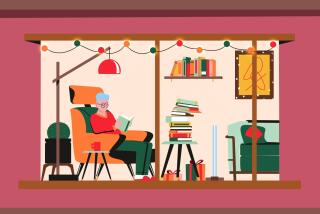For Circle of Friends, Books Give Life to World
They must have raised a few eyebrows at the Beverly Hills library 30 years ago, these middle-aged Jewish matrons requesting books like Richard Wright’s “Black Power” and Eldridge Cleaver’s “Soul on Ice.”
But that was the point, says Alice Raskoff.
“We wanted to read books that took us outside our lives. There was a whole world out there” to be discovered.
So she and 14 acquaintances--housewives, mostly, from West L.A.--formed the Recovery Book Club in 1958 (named after a now-defunct children’s charity their dues would support), and set out on a journey of discovery that has endured for more than 41 years, broadening the boundaries of their lives and deepening the bonds that make them friends.
They were well into middle-age when their book group was born. They’d met through the PTA, their temple, the hospital guild and volunteer work with other charity leagues.
They were college-educated, middle-class women whose husbands were busy building careers, whose children had begun to leave the nest. One was a professional librarian, with the inside track on books that were bound to become controversial. A reading circle seemed a pleasant enough way to fill their days.
From the start, the club was part social, part intellectual, part philanthropic. They met each month at a different home. The hostess prepared lunch and presented a review of a book and its author.
Today the group has shrunk from 15 to seven. Some died, others moved away. Only Alice, Rosalie Rubin, Stella Lavis, Evelyn Vogel, Dorothy Merchasin and sisters Elsie Harris and Mildred Ehre remain.
They demur when asked their age.
“Just say that five of us are in our 90s, and the other two are almost there,” says Alice. The baby of the group, she’ll be 87 in December.
Most still live within a few miles of one another. Some have trouble getting around, but still make it to book-group meetings every month, ferried by taxis, friends or grandchildren.
These days, as often as not, they rely on takeout food for lunch. But they still drink their wine from crystal goblets and serve the spinach ravioli and Chinese chicken salad at the dining room table on china plate.
And lunch still ends with a homemade treat: Evelyn’s chocolate cake or Rosalie’s brownies or pecan tarts, made with a recipe handed down from Blanche before she passed away.
Their small talk has shifted over the years, from the exploits of their children to tales of great-grandchildren, from accounts of vacations in foreign lands to cataract surgeries and hip replacements.
They still show up manicured and fashionably dressed, their hair tinted and styled. But they chat less about the sales at Neiman Marcus than where to get a good buy on an adjustable bed or the merits of those elevator chairs for stairs.
All but Rosalie have been widowed, but most of the others are still hardy enough to live alone.
And they are still choosing books that give them a window into a world very different from their own.
*
Books like “Memoirs of a Geisha,” “American Pastoral,” “Divine Secrets of the Ya-Ya Sisterhood” . . . books that make you realize, Evelyn says, that around the world, across eras and through generations, despite different circumstances and settings, “people are really very much the same.”
The book discussions often go haltingly these days. Their hearing is not so good anymore, and some of the girls’ memories are fading. So the others talk louder or lean in close; no one seems to mind repeating.
“It’s at the point,” Rosalie confides, “where some of the girls don’t read the books. But they still come every month. We still enjoy each other’s company.”
Their affection for one another shows in their easy camaraderie. They finish each other’s sentences, scold anyone who drones on too long, offer advice unstintingly.
They’re amused and a little bewildered by the complicated machinations of book groups today, with their hired consultants and professional mediators, paid to keep peace among members who cannot agree on what books to read.
“We just read whatever anybody thought would be nice to read,” says Rosalie. “One of our members only wanted love and romance, another only wanted to read books about Israel. We used to laugh about it, but we went along. We figured we’d have time to get to it all.”
And a look at the list she’s kept of the books they’ve read reveals that they almost have. They’ve read poetry by Walt Whitman and Edna St. Vincent Millay, plays by Chekhov and Shakespeare, literary classics by Edgar Allan Poe, Edith Wharton, Henry James.
There is John F. Kennedy’s “Profiles in Courage” and Madeleine Albright’s biography, “Seasons of Her Life.” Novels by Toni Morrison, Phillip Roth, Kazuo Ishiguro, Isabel Allende. A biography of Eleanor Roosevelt and “The Autobiography of Malcolm X.”
Books today, they’ll tell you, are just as good as they ever were. And just as bad.
“Some of that stuff we read is sick. And some of it will put you to sleep,” Evelyn confesses.
And some will make you glad to still be alive.
*
Sandy Banks can be reached by e-mail at [email protected].
GEO WEST LOS ANGELES
More to Read
Sign up for our Book Club newsletter
Get the latest news, events and more from the Los Angeles Times Book Club, and help us get L.A. reading and talking.
You may occasionally receive promotional content from the Los Angeles Times.








